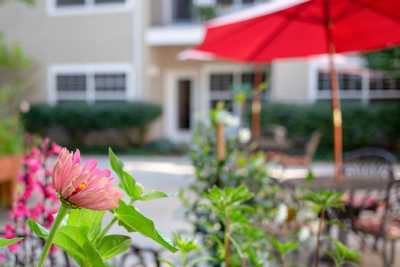Top Reasons to Choose Personalized Memory Care Over Traditional Programs
Top Reasons to Choose Personalized Memory Care Over Traditional Programs
Blog Article
Exploring the Value of Memory Care Services in Small Memory Care Houses
Memory treatment solutions play a vital role in improving the lives of people with cognitive impairments. In tiny memory care homes, the focus changes to individualized treatment customized to every local's distinct needs. These intimate setups foster deeper connections and a helpful community. However, the concern remains: exactly how do these settings especially contribute to the emotional well-being of both citizens and their households? Understanding this dynamic exposes real worth of specialized memory treatment.
Comprehending Memory Treatment and Its Importance
Memory treatment is a vital component in resolving the distinct demands of individuals with cognitive disabilities, such as mental deterioration and Alzheimer's illness. This customized type of treatment concentrates on producing a supportive and secure environment customized to the challenges dealt with by these people. Memory care facilities use trained personnel that understand the intricacies of cognitive decrease, offering personalized treatment that advertises dignity and respect.Activities and routines are created to stimulate memory retention and cognitive function while ensuring security and security. Furthermore, memory care stresses social communication, which can minimize feelings of isolation and improve emotional wellness. By promoting a structured environment, individuals can navigate their everyday lives with more confidence. Comprehending the significance of memory care reveals its function in enhancing top quality of life, making it possible for people to keep as much independence as possible while getting the assistance they require.

The Benefits of Smaller Memory Treatment Houses
Smaller sized memory treatment homes offer an even more intimate setup that can considerably enhance the high quality of care for residents. With fewer residents, personnel can construct more powerful connections, promoting depend on and emotional connections. This individualized attention frequently causes enhanced communication, making it simpler for caregivers to recognize and satisfy the distinct needs of each resident. Additionally, smaller sized settings normally reduce interruptions and stress factors, advertising a relaxing environment conducive to memory retention and psychological wellness. The layout of smaller sized homes frequently urges socializing among homeowners, permitting for significant communications that can deal with feelings of isolation. These homes can adjust a lot more quickly to changes in care needs, making sure that citizens obtain prompt assistance - small memory carehomes Charlotte. On the whole, the individualized focus, minimized tension, and improved social chances found in smaller memory treatment homes develop a nurturing environment that supports both cognitive feature and emotional health
Personalized Treatment Plans for Individual Demands
Customized care strategies are crucial in resolving the special requirements of people in memory care. These plans commonly consist of tailored support strategies that improve daily living and advertise well-being. In addition, individualized task involvement helps citizens get in touch with their passions, fostering a feeling of function and pleasure.
Tailored Support Strategies
Recognizing the one-of-a-kind requirements of each person is basic when establishing tailored assistance techniques in memory treatment solutions. These strategies involve producing customized care plans that satisfy the certain needs, choices, and abilities of homeowners. By assessing cognitive feature, psychological health, and physical health, caregivers can design effective interventions that advertise convenience and freedom - small memory carehomes Charlotte. This customized approach warranties that each homeowner receives appropriate support, boosting their lifestyle. Normal analyses and changes to these strategies are crucial, as they allow caregivers to react proactively to changing needs. In addition, involving member of the family in the planning process fosters a collective setting, reinforcing the support network for people with memory challenges. Ultimately, customized assistance methods are vital for providing compassionate and effective memory care
Individualized Task Engagement
Creating significant engagement with individualized tasks is important in memory treatment services. Memory treatment homes prioritize customized care strategies that satisfy the one-of-a-kind needs and choices of each local. These strategies commonly include tasks tailored to citizens' interests, capacities, and cognitive degrees, enhancing their sense of objective and dignity. By including familiar regimens, hobbies, and social communications, caretakers can promote cognitive function and psychological well-being. Personalized task engagement not only promotes an encouraging atmosphere yet likewise encourages citizens her explanation to keep their independence. The active engagement in these tailored activities can bring about improved mood and minimized anxiety, strengthening the relevance of a holistic technique in memory treatment that acknowledges each person's trip and distinct experiences.
Producing an Encouraging Community Atmosphere
While promoting an encouraging area environment is essential for those with memory care needs, it requires deliberate style and thoughtful involvement. Creating such an atmosphere includes a mix of physical room and social connections. Little memory treatment homes can benefit greatly from layouts that encourage social interaction, such as open common areas and cozy celebration rooms. These layouts advertise a sense of belonging and protection for residents.Moreover, employee play an essential role in growing this setting. Educating caretakers to prioritize compassion and energetic listening promotes and enhances relationships trust fund. On top of that, entailing households in care strategies and neighborhood activities can reinforce bonds and produce a network of support.
Enhancing Social Involvement and Tasks
Effective social interaction and activities are essential for boosting the wellness of locals in memory treatment homes. These interactions not just cultivate a sense of belonging but additionally promote cognitive features, which can favorably affect memory retention. Tiny memory care homes typically offer personalized programs customized to the one-of-a-kind interests and abilities of each citizen, enabling more efficient and meaningful engagement.Activities such as art treatment, songs sessions, and group video games encourage citizens to connect with one another, advertising friendships and lowering feelings of isolation. In addition, integrating exterior activities, such as horticulture or nature walks, can improve state of mind and overall health.These enhancing experiences aid locals preserve a feeling of purpose and happiness in their lives. By developing an atmosphere that focuses on social communication, tiny memory care homes considerably add to the emotional and psychological health of their residents, ensuring they really feel valued and sustained in their journey.
Supporting Households Via the Trip
As families browse the challenges of taking care of an enjoyed one with memory impairment, the support supplied by tiny memory care homes becomes crucial. small memory carehomes Charlotte. These homes offer not only customized take care of locals however additionally valuable resources for households. By promoting a joint environment, small memory care homes urge open interaction, allowing households to share issues and share experiences.Support teams and educational workshops are commonly available, gearing up households with understanding and approaches to manage the intricacies of amnesia. Such initiatives help in reducing sensations of seclusion, as families connect with others dealing with comparable situations.Moreover, tiny memory care homes frequently supply personalized updates on residents' wellness, relieving families' worries and helping them really feel included in their enjoyed one's day-to-day life. This alternative strategy to sustain not only enhances the quality of look after homeowners yet additionally equips families throughout their emotional journey
The Influence of Specialized Personnel Training on Treatment High Quality
In little memory care homes, the quality of treatment is exceptionally influenced by the training and know-how of the personnel. Specialized training gears up caregivers with essential abilities to understand and resolve the special demands of locals with memory disabilities. Understanding of dementia-related behaviors, reliable communication strategies, and person-centered care methods enhances the capability of team to create an encouraging environment.Moreover, trained personnel are much better prepared to manage difficult scenarios, lowering the possibility of problems and making sure a calmer atmosphere. This training promotes a much deeper emotional link between caretakers and residents, advertising count on and enhancing total wellness. Additionally, specialized training can cause greater task contentment among caregivers, minimizing turnover rates and giving connection of care for residents. Inevitably, the investment in staff education and learning considerably boosts the standard of care, which is essential for improving the top quality of life for individuals in find more info little memory treatment homes.

Often Asked Inquiries
Exactly how Do I Choose the Right Memory Treatment Home for My Loved One?
Choosing the ideal memory treatment home involves examining individual needs, checking out centers, evaluating personnel experience, recognizing treatment options, thinking about place, comparing expenses, and looking for referrals. Each factor plays an important function in making certain ideal care.
What Is the Expense Distinction Between Huge and small Memory Care Facilities?
The expense distinction between large and little memory treatment facilities can vary substantially. Generally, small homes may provide more customized care at a higher per-person rate, while larger facilities frequently offer much more features at a reduced total cost.
Exactly How Typically Can Households Go To Their Loved Ones in Memory Treatment Houses?
Families can generally visit their enjoyed ones in memory care homes as frequently as content desired, with several facilities encouraging normal sees to preserve connections and assistance emotional well-being, though particular policies might vary by home.
What Details Tasks Are Provided in Tiny Memory Care Residences?
Little memory care homes commonly use activities like crafts and arts, music treatment, gardening, workout classes, and cognitive games. These activities are created to involve residents, promote their minds, and advertise social interaction among them.
Are There Any Kind Of Age Restrictions for Locals in Memory Treatment Facilities?
Age constraints for homeowners in memory treatment facilities commonly differ by place and individual facility plans. Generally, these homes deal with older grownups, usually calling for residents to be at least 55 or 60 years old. In little memory treatment homes, the emphasis moves to individualized treatment customized to each homeowner's unique needs. Memory care facilities employ trained staff who understand the complexities of cognitive decline, providing personalized care that promotes dignity and routines and respect.activities are developed to promote memory retention and cognitive function while guaranteeing security and safety. Smaller memory care homes use an even more intimate setup that can markedly enhance the quality of care for residents. Memory care homes prioritize customized care strategies that provide to the one-of-a-kind demands and choices of each local. As families navigate the difficulties of caring for a liked one with memory impairment, the support supplied by tiny memory treatment homes comes to be essential.
Report this page